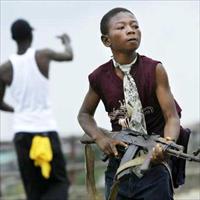AFRICA: Former child soldiers at risk of HIV

Children across Africa are emerging from conflicts in which they have served as soldiers or the 'wives' of rebel commanders and find themselves in a new, unfamiliar world. Usually poor and often without family, many resort to coping mechanisms that put them at risk of contracting HIV.
"We have found that in places like Sierra Leone, large numbers of demobilised child soldiers are increasingly injecting illegal drugs," said Dr Josef Decosas, senior HIV policy adviser at Plan International, a development agency working for and with children. "And we know that as soon as HIV comes into a network of drug users it spreads like wildfire."
He said recent research had shown that conflict tended to curb the spread of HIV by limiting movement and social interactions, but when wars ended these communities returned to normal and mobility increased, so HIV became a real issue.
"In Uganda, the HIV prevalence in the LRA [rebel Lord's Resistance Army] is thought to be quite low, but in northern Uganda's local population it is quite high, so demobilised children need to be prepared to avoid HIV," he said.
Olushola Ismail, head of the United Nations Children's Fund's (UNICEF) sub-office in Kitgum district, northern Uganda, said the agency was involved, via its partners, in receiving and reintegrating former abductees of the LRA, most of whom had volunteered for HIV tests that returned negative results. The LRA is estimated to have abducted some 30,000 children during the region's 21-year conflict.
According to Decosas, the fact that many former child soldiers were deliberately desensitised to the horrors of killing and violent sexual assaults compounded the HIV risk because they found these attitudes hard to shake off when they returned to normal society. "They are conditioned to be disinhibited in every way - to violent behaviour and sexual behaviour. It's hard for them to readjust."
Need for a re-think on reintegration policies
Until now, organisations in Uganda have focused on housing former child soldiers in reception centres where they undergo two to three months of psycho-social care and learn how to live in regular society again before being resettled with families in the camps.
"In the Ugandan context, these children are coming out of the bush and after a short stay at the reception centres are being put in the internally displaced camps," said Daisy Muculezi, programme officer in charge of child protection with the UK-based Save the Children in Uganda.
"This has the a lot to do with how they cope; many of them resort to sex work, or brew alcohol to make ends meet - common means of earning a living in the camps - others abuse alcohol."
Muculezi noted that the follow-up of these resettled children had not been as regular as it could have been, and many had returned to the streets within weeks of being placed, unable to cope with life in the camps.
"We are now in the recovery phase in northern Uganda, and the government's peace, development and recovery plan for the region has a social welfare component that we are looking at to fill the gaps in our handling of former abductees."
One of the ways to better serve the children, according to UNICEF's Ismail, is to let the children have a say in choosing their future. "We do not want to force the children into vocations they do not want, so we let them decide whether they wand to be tailors, bakers, carpenters, or would rather continue with formal schooling."
Plan International has school programmes for former child soldiers in Angola, Mozambique and Sierra Leone that incorporate peace-building training and counselling for girls who had children as a result of rape during the conflict, as well as lessons in HIV prevention.
According to the UN, 58 groups in 13 countries - including seven in Africa - continue to recruit and use children in wars.
 Back and Next - Back and Next
Back and Next - Back and Next See Also - See Also
See Also - See Also